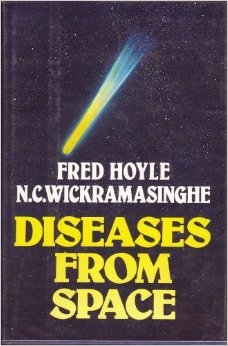Diseases from Space
Diseases from Space
Diseases from Space is a hypothesis that suggests that certain diseases on Earth may have extraterrestrial origins. This concept is part of the broader field of astrobiology and intersects with theories of panspermia, which propose that life, or the precursors of life, can travel through space and potentially seed life on other planets.
History[edit | edit source]
The idea of diseases originating from space has been considered in various forms throughout history. In the 19th century, scientists like Lord Kelvin and Svante Arrhenius proposed that life could be distributed throughout the universe via comets and meteorites. The modern hypothesis of diseases from space was popularized by Fred Hoyle and Chandra Wickramasinghe in the 20th century. They suggested that influenza outbreaks and other pandemics could be linked to extraterrestrial pathogens.
Mechanisms[edit | edit source]
The primary mechanisms proposed for the transmission of diseases from space include:
- Meteorites: Meteorites that land on Earth may carry microorganisms or organic compounds that could potentially cause disease.
- Comets: Comets passing close to Earth could release dust and particles that contain pathogens.
- Interplanetary dust: Tiny particles that travel through space and enter Earth's atmosphere could carry microorganisms.
Evidence and Controversy[edit | edit source]
The hypothesis of diseases from space remains controversial and is not widely accepted in the scientific community. Critics argue that there is insufficient evidence to support the idea and that most diseases can be explained by terrestrial origins. Proponents, however, point to patterns in the timing and spread of pandemics as potential indicators of extraterrestrial involvement.
Related Concepts[edit | edit source]
- Panspermia: The theory that life exists throughout the universe and can be spread by space dust, meteoroids, asteroids, comets, planetoids, or potentially by spacecraft.
- Astrobiology: The study of the origin, evolution, distribution, and future of life in the universe.
- Exobiology: The branch of science that deals with the possibility and likely nature of life on other planets or in space.
In Popular Culture[edit | edit source]
The idea of diseases from space has been a popular theme in science fiction. Notable examples include:
- The Andromeda Strain: A novel by Michael Crichton that explores the outbreak of a deadly extraterrestrial microorganism.
- War of the Worlds: A novel by H.G. Wells where Martian invaders are ultimately defeated by Earth's microorganisms.
See Also[edit | edit source]
References[edit | edit source]
External Links[edit | edit source]
Search WikiMD
Ad.Tired of being Overweight? Try W8MD's physician weight loss program.
Semaglutide (Ozempic / Wegovy and Tirzepatide (Mounjaro / Zepbound) available.
Advertise on WikiMD
|
WikiMD's Wellness Encyclopedia |
| Let Food Be Thy Medicine Medicine Thy Food - Hippocrates |
Translate this page: - East Asian
中文,
日本,
한국어,
South Asian
हिन्दी,
தமிழ்,
తెలుగు,
Urdu,
ಕನ್ನಡ,
Southeast Asian
Indonesian,
Vietnamese,
Thai,
မြန်မာဘာသာ,
বাংলা
European
español,
Deutsch,
français,
Greek,
português do Brasil,
polski,
română,
русский,
Nederlands,
norsk,
svenska,
suomi,
Italian
Middle Eastern & African
عربى,
Turkish,
Persian,
Hebrew,
Afrikaans,
isiZulu,
Kiswahili,
Other
Bulgarian,
Hungarian,
Czech,
Swedish,
മലയാളം,
मराठी,
ਪੰਜਾਬੀ,
ગુજરાતી,
Portuguese,
Ukrainian
Medical Disclaimer: WikiMD is not a substitute for professional medical advice. The information on WikiMD is provided as an information resource only, may be incorrect, outdated or misleading, and is not to be used or relied on for any diagnostic or treatment purposes. Please consult your health care provider before making any healthcare decisions or for guidance about a specific medical condition. WikiMD expressly disclaims responsibility, and shall have no liability, for any damages, loss, injury, or liability whatsoever suffered as a result of your reliance on the information contained in this site. By visiting this site you agree to the foregoing terms and conditions, which may from time to time be changed or supplemented by WikiMD. If you do not agree to the foregoing terms and conditions, you should not enter or use this site. See full disclaimer.
Credits:Most images are courtesy of Wikimedia commons, and templates, categories Wikipedia, licensed under CC BY SA or similar.
Contributors: Prab R. Tumpati, MD

